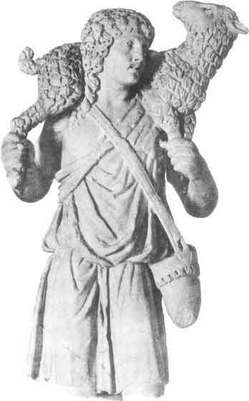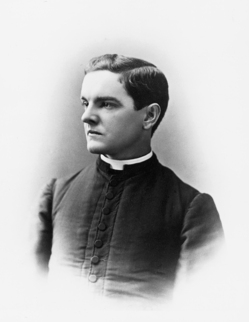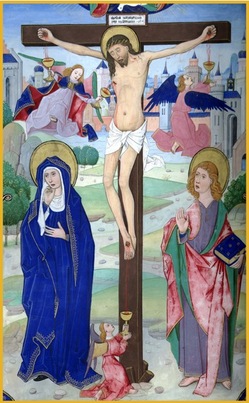Here is a wonderful story of an icon writer from
Silvia Dimitrova’s webpage can seen here.
May God grant Silvia many years!
Here is a wonderful story of an icon writer from
Silvia Dimitrova’s webpage can seen here.
May God grant Silvia many years!
 On the occasion of the next World Day of prayer for vocations to the priesthood and to the consecrated life, which will be celebrated on
On the occasion of the next World Day of prayer for vocations to the priesthood and to the consecrated life, which will be celebrated on
The vocation to the priesthood and to the consecrated life constitutes a special gift of God which becomes part of the great plan of love and salvation that God has for every man and woman and for the whole of humanity. The Apostle Paul, whom we remember in a special way during this Pauline Year dedicated to the Two-thousandth anniversary of his birth, writing to the Ephesians says, “Blessed be the God and Father of our Lord Jesus Christ, who has blessed us in Christ with every spiritual blessing in the heavenly places, even as he chose us in him before the foundation of the world, that we should be holy and blameless before him” (Ef 1:3-4). In the universal call to holiness, of particular relevance is God’s initiative of choosing some to follow his Son Jesus Christ more closely, and to be his privileged ministers and witnesses. The divine Master personally called the Apostles “to be with him, and to be sent out to preach and have authority to cast out demons” (Mk
Our first duty, therefore, is to keep alive in families and in parishes, in movements and in apostolic associations, in religious communities and in all the sectors of diocesan life this appeal to the divine initiative with unceasing prayer. We must pray that the whole Christian people grows in its trust in God, convinced that the “Lord of the harvest” does not cease to ask some to place their entire existence freely at his service so as to work with him more closely in the mission of salvation. What is asked of those who are called, for their part, is careful listening and prudent discernment, a generous and willing adherence to the divine plan, and a serious study of the reality that is proper to the priestly and religious vocations, so as to be able to respond responsibly and with conviction.
The Catechism of the Catholic Church rightly reminds us that God’s free initiative requires a free response on the part of men and women; a positive response which always presupposes acceptance of and identification with the plan that God has for everyone; a response which welcomes the Lord’s loving initiative and becomes, for the one who is called, a binding moral imperative, an offering of thanksgiving to God and a total cooperation with the plan which God carries out in history (cf. n. 2062).
 Contemplating the mystery of the Eucharist, which expresses in a sublime way the free gift of the Father in the Person of his Only Begotten Son for the salvation of mankind, and the full and docile readiness of Christ to drink to the dregs the “cup” of the will of God (cf. Mt 26:39), we can more readily understand how “faith in the divine initiative” models and gives value to the “human response“. In the Eucharist, that perfect gift which brings to fulfilment the plan of love for the redemption of the world, Jesus offers himself freely for the salvation of mankind. “The Church”, my beloved predecessor John Paul II wrote, “has received the Eucharist from Christ her Lord not as a gift – however precious – among so many others, but as the gift par excellence, for it is the gift of himself, of his person in his sacred humanity, as well as the gift of his saving work” (Ecclesia de Eucharistia, 11).
Contemplating the mystery of the Eucharist, which expresses in a sublime way the free gift of the Father in the Person of his Only Begotten Son for the salvation of mankind, and the full and docile readiness of Christ to drink to the dregs the “cup” of the will of God (cf. Mt 26:39), we can more readily understand how “faith in the divine initiative” models and gives value to the “human response“. In the Eucharist, that perfect gift which brings to fulfilment the plan of love for the redemption of the world, Jesus offers himself freely for the salvation of mankind. “The Church”, my beloved predecessor John Paul II wrote, “has received the Eucharist from Christ her Lord not as a gift – however precious – among so many others, but as the gift par excellence, for it is the gift of himself, of his person in his sacred humanity, as well as the gift of his saving work” (Ecclesia de Eucharistia, 11).
It is priests who are called to perpetuate this salvific mystery from century to century until the Lord’s glorious return, for they can contemplate, precisely in the Eucharistic Christ, the eminent model of a “vocational dialogue” between the free initiative of the Father and the faithful response of Christ. In the celebration of the Eucharist it is Christ himself who acts in those whom he chooses as his ministers; he supports them so that their response develops in a dimension of trust and gratitude that removes all fear, even when they experience more acutely their own weakness (cf. Rm 8:26-28), or indeed when the experience of misunderstanding or even of persecution is most bitter (cf. Rm 8:35-39).
The awareness of being saved by the love of Christ, which every Mass nourishes in the faithful and especially in priests, cannot but arouse within them a trusting self-abandonment to Christ who gave his life for us. To believe in the Lord and to accept his gift, therefore, leads us to entrust ourselves to Him with thankful hearts, adhering to his plan of salvation. When this does happen, the one who is “called” voluntarily leaves everything and submits himself to the teaching of the divine Master; hence a fruitful dialogue between God and man begins, a mysterious encounter between the love of the Lord who calls and the freedom of man who responds in love, hearing the words of Jesus echoing in his soul, “You did not choose me, but I chose you and appointed you that you should go and bear fruit and that your fruit should abide” (Jn 15:16).
This intertwining of love between the divine initiative and the human response is present also, in a wonderful way, in the vocation to the consecrated life. The Second Vatican Council recalls, “The evangelical counsels of chastity dedicated to God, poverty and obedience are based upon the words and examples of the Lord. They were further commanded by the apostles and Fathers of the Church, as well as by the doctors and pastors of souls. The counsels are a divine gift, which the Church received from its Lord and which it always safeguards with the help of His grace” (Lumen Gentium, 43).
Once more, Jesus is the model of complete and trusting adherence to the will of the Father, to whom every consecrated person must look. Attracted by him, from the very first centuries of Christianity, many men and women have left families, possessions, material riches and all that is humanly desirable in order to follow Christ generously and live the Gospel without compromise, which had become for them a school of deeply rooted holiness. Today too, many undertake this same demanding journey of evangelical perfection and realise their vocation in the profession of the evangelical counsels. The witness of these our brothers and sisters, in contemplative monasteries, religious institutes and congregations of apostolic life, reminds the people of God of “that mystery of the Kingdom of God is already at work in history, even as it awaits its full realization in heaven” (Vita Consecrata, 1).
 Who can consider himself worthy to approach the priestly ministry? Who can embrace the consecrated life relying only on his or her own human powers? Once again, it is useful to reiterate that the response of men and women to the divine call, whenever they are aware that it is God who takes the initiative and brings His plan of salvation to fulfilment, is never patterned after the timid self-interest of the worthless servant who, out of fear, hid the talent entrusted to him in the ground (cf. Mt 25:14-30), but rather expresses itself in a ready adherence to the Lord’s invitation, as in the case of Peter who, trusting in the Lord’ word, did not hesitate to let down the net once more even after having toiled all night and catching nothing (cf. Lk 5:5). Without in any sense renouncing personal responsibility, the free human response to God thus becomes “co-responsibility”, responsibility in and with Christ, through the action of his Holy Spirit; it becomes communion with the One who makes it possible for us to bear much fruit (cf. Jn 15:5).
Who can consider himself worthy to approach the priestly ministry? Who can embrace the consecrated life relying only on his or her own human powers? Once again, it is useful to reiterate that the response of men and women to the divine call, whenever they are aware that it is God who takes the initiative and brings His plan of salvation to fulfilment, is never patterned after the timid self-interest of the worthless servant who, out of fear, hid the talent entrusted to him in the ground (cf. Mt 25:14-30), but rather expresses itself in a ready adherence to the Lord’s invitation, as in the case of Peter who, trusting in the Lord’ word, did not hesitate to let down the net once more even after having toiled all night and catching nothing (cf. Lk 5:5). Without in any sense renouncing personal responsibility, the free human response to God thus becomes “co-responsibility”, responsibility in and with Christ, through the action of his Holy Spirit; it becomes communion with the One who makes it possible for us to bear much fruit (cf. Jn 15:5).
An emblematic human response, full of trust in God’s initiative, is the generous and unmitigated “Amen” of the Virgin of Nazareth, uttered with humble and decisive adherence to the plan of the Most High announced to her by God’s messenger (cf. Lk 1:38). Her prompt “Yes” allowed Her to become the Mother of God, the Mother of our Saviour. Mary, after this first “fiat”, had to repeat it many times, even up to the culminating moment of the crucifixion of Jesus, when “standing by the cross of Jesus” as the Evangelist John notes, she participated in the dreadful suffering of her innocent Son. And it was from the cross, that Jesus, while dying, gave her to us as Mother and entrusted us to her as sons and daughters (cf. Jn 19:26-27); she is especially the Mother of priests and consecrated persons. I want to entrust to her all those who are aware of God’s call to set out on the road of the ministerial priesthood or consecrated life.
Dear friends, do not become discouraged in the face of difficulties and doubts; trust in God and follow Jesus faithfully and you will be witnesses of the joy that flows from intimate union with him. Imitating the Virgin Mary whom all generations proclaim as blessed because she believed (cf. Lk 1:48), commit yourselves with every spiritual energy, to realise the heavenly Father’s plan of salvation, cultivating in your heart, like her, the ability to be astonished and to adore him who is mighty and does “great things”, for Holy is his name (cf. Lk 1:49).
From the
Benedictus PP. XVI
 The Dominican Sisters of Saint Cecilia have a new, beautiful website. Visit them here.
The Dominican Sisters of Saint Cecilia have a new, beautiful website. Visit them here.
 Today marks the 127th anniversary of the State of Connecticut granting a charter to the Knights of Columbus. The dream of a lay Catholic men’s fraternity of the Venerable Servant of God Michael J. McGivney came true.
Today marks the 127th anniversary of the State of Connecticut granting a charter to the Knights of Columbus. The dream of a lay Catholic men’s fraternity of the Venerable Servant of God Michael J. McGivney came true.
May God grant the Knights of Columbus abundant blessings!
Commentary on the Book of Numbers
Saint Cyril of
As the first-fruits of our renewed humanity, Christ escaped the curse of the law precisely by becoming accursed for our sake. He overcame the forces of corruption by himself becoming once more “free among the dead.” He trampled death under foot and came to life again, and then he ascended to the Father as an offering, the first-fruits, as it were, of the human race. “He ascended,” as Scripture says, “not to a sanctuary made by human hands, a mere copy of the real one, but into heaven itself, to appear in God’s presence on our behalf.” He is the life-giving bread that came down from heaven, and by offering Himself to God the Father as a fragrant sacrifice for our sake, he also delivers us from our sins and frees us from the faults that we commit through ignorance.
 The human race may be compared to spikes of wheat in a field, rising, as it were, from the earth, awaiting their full growth and development, and then in time being cut down by the reaper, which is death. The comparison is apt, since Christ Himself spoke of our race in this way when He said to His holy disciples: “Do you not say, ‘Four months and it will be harvest time?’ Look at the fields I tell you, they are already white and ready for harvesting. The reaper is already receiving his wages and bringing in a crop for eternal life.”
The human race may be compared to spikes of wheat in a field, rising, as it were, from the earth, awaiting their full growth and development, and then in time being cut down by the reaper, which is death. The comparison is apt, since Christ Himself spoke of our race in this way when He said to His holy disciples: “Do you not say, ‘Four months and it will be harvest time?’ Look at the fields I tell you, they are already white and ready for harvesting. The reaper is already receiving his wages and bringing in a crop for eternal life.”
Now Christ became like one of us; He sprang from the holy Virgin like a spike of wheat from the ground. Indeed, He spoke of Himself as a grain of wheat when he said: “I tell you truly, unless a grain of wheat falls into the ground and dies, it remains as it was, a single grain; but if it dies its yield is very great.” And so, like a sheaf of grain, the first-fruits, as it were, of the earth, he offered Himself to the Father for our sake.
For we do not think of a spike of wheat, any more than we do of ourselves, in isolation. We think of it rather as part of a sheaf, which is a single bundle made up of many spikes. The spikes have to be gathered into a bundle before they can be used, and this is the key to the mystery they represent, the mystery of Christ who, though one, appears in the image of a sheaf to made up of many, as in fact he is. Spiritually, He contains in Himself all believers. “As we have been raised up with Him,” writes
The Royal Banner forward goes,
 The mystic Cross refulgent glows:
The mystic Cross refulgent glows:
Where He, in Flesh, flesh who made,
Upon the Tree of pain is laid.
Behold! The nails with anguish fierce,
His outstretched arms and vitals pierce:
Here our redemption to obtain,
The Mighty Sacrifice is slain.
Here the fell spear his wounded side
With ruthless onset opened wide:
To wash us in that cleansing flood,
Thence mingled Water flowed, and Blood.
Fulfilled is all that David told
In true prophetic song, of old:
Unto the nations, lo! saith he,
Our God hath reignèd from the Tree.
O Tree! In radiant beauty bright!
With regal purple meetly dight!
Thou chosen stem! divinely graced,
Which hath those Holy Limbs embraced!
How blest thine arms, beyond compare,
Which Earth’s Eternal Ransom bare!
That Balance where His Body laid,
The spoil of vanquished Hell outweighed.
O Cross! all hail! sole hope, abide
With us now in this Passion-tide:
New grace in pious hearts implant,
And pardon to the guilty grant!
Hail wondrous Altar! Victim hail!
Thy Glorious Passion shall avail!
Where death Life’s very Self endured,
Yet life by that same Death secured.
Thee, mighty Trinity! One God!
Let every living creature laud;
Whom by the Cross Thou dost deliver,
O guide and govern now and ever! Amen.
Translation from “The Psalter of Sarum”:
Tonight we sang this hymn, in translation of course. The hymn “Vexilla Regis” was composed by Saint Venantius Fortunatus (530-609) and considered by many to be one of the greatest of the sacred Liturgy. “Vexilla Regis” was composed for the reception of a Relic of the True Cross by Queen Radegunda for her monastery church at near
This place was made by God, an inestimably holy place. It is without reproof.
Most people are accustomed to celebrating anniversaries: wedding, ordination, religious profession, moving to a new place, etc. From time immemorial the Church has celebrated the anniversary of a church’s dedication; there are notable examples of this in the liturgical calendar, e.g., Dedication of the Lateran Basilica. Today, in the life of the Diocese of Charlotte and the monks of Mary Help of Christian – Belmont Abbey, the Abbey Basilica is honored because of it consecration in 1965 by Abbot Walter Coggin, abbot nullius. Dom Agostino celebrated the conventual Mass. The wonderful drama of the Liturgies since first Vespers last evening has been the 12 dedication candles lit. They are rearely lit even in the most liturgically sensible places that seeing them glow is just wonderful. Wouldn’t it be a good thing if pastors lit the dedication candles on all the feasts of the Lord and the feasts of the apostles!
In 1892 Abbot-Bishop Leo Michael Haid blessed and laid the cornerstone for the abbey church which in time became the cathedral for the Apostolic Vicariate (founded in 1910). This church had two significant uses: it was the church in which the monks daily prayed and it was the heart of Catholic life for the state of North Carolina. According to the monks, the cathedral was only blessed in the 19th century because there was a mortgage and it had a wooden altar. The cathedral was renovated in 1964-65 and it needed to be properly consecrated which was done on this date in 1965. As history would have it, the abbey church was still the cathedral but by 1960 the territory had been reduced to the land on which the abbey and cathedral sat. The Diocese of Raleigh had been established in 1924 and preparations for the erection of the Diocese of Charlotte were on the way, ultimately coming in 1972.
The point of the festive Mass on such an anniversary and the use of special antiphons used in the Divine Office is honor God by keeping sincere our worship in the saving love of this church. It is also a keen reminder that we find our refuge in the Lord while praying in spirit and truth.
Some points from recent ecclesial documents may help focus our attention on the meaning of the Church:
The church building is a sign and reminder of the immanence and transcendence of God –who chose to dwell among us and whose presence cannot be contained or limited to any single place. …Churches are signs of the pilgrim church on earth; they are images that proclaim the heavenly Jerusalem. (Built of Living Stones, no. 50)
The dedication of a church, especially a cathedral, is a significant and rare event in the life of a Christian community. It involves more than merely setting aside a building for the celebration of sacred things, since the people who plan, build, and dedicate a sacred
place are themselves the Church, “that is, the temple of God built of living stones, where the Father is worshiped in spirit and in truth. Rightly, then, from early times the name ‘church’ has also been given to the building in which the Christian community gathers to hear the Word of God, to pray together, to celebrate the Sacraments, and to participate in the Eucharist.” (Rite for the Dedication of a Church and an Altar, chapter 2, no. 1); this building is both the house of God on earth (domus Dei) and a house fit for the prayers of the saints (domus ecclesiae). (Built of Living Stones, no. 16).
In the end, the text from a hymn used at a church’s dedication speaks volumes:
O how amiable are thy dwellings: thou Lord of hosts!
My soul hath a desire and a longing to enter into the courts of the Lord:
My heart and my flesh rejoice in the living God.
Yea, the sparrow hath found her a house,
and the swallow a nest where she may lay her young:
even the altars, O Lord of hosts, my King and my God.
Blessed are they that dwell in thy house: they will be always praising thee.
The glorious Majesty of the Lord our God be upon us:
prosper thou the work of our hands upon us.
O prosper thou our handywork, O prosper thou our handywork.
O God our help in ages past, Our hope for years to come,
Our shelter from the stormy blast, And our eternal home.
(Text Psalms 84 & 90; Isaac Watts (1674-1748)
An Oblate of Saint Benedict is a Christian individual (lay people and diocesan priests) who is associated with a particular
 Benedictine monastery, usually one that is close to where one lives, in order to enrich his or her Christian way of life. An Oblate forms and sustains a spiritual bond with the monastery where the oblation is made. So, the hope is that those making an oblation actually share in a spiritual union that is based in friendship with a particular monastic community. Bonded in prayer, love and commitment, Oblates are partners in the prayer and works of the monastery and with the professed monks, nuns and oblates search for God together with the goal of arriving at our destiny: the Beatific Vision, God.
Benedictine monastery, usually one that is close to where one lives, in order to enrich his or her Christian way of life. An Oblate forms and sustains a spiritual bond with the monastery where the oblation is made. So, the hope is that those making an oblation actually share in a spiritual union that is based in friendship with a particular monastic community. Bonded in prayer, love and commitment, Oblates are partners in the prayer and works of the monastery and with the professed monks, nuns and oblates search for God together with the goal of arriving at our destiny: the Beatific Vision, God.
Oblates are most often Catholics, but practicing members of the Christian ecclesial communities are also welcome to be Oblates. But for Catholic Oblates, there is a crucial connection between the Holy Eucharist and sacred Scripture, devotion to the Blessed Virgin Mary and faithfulness to the Church teaching. The hope is that an Oblate conforms his or her life according the Gospel, the Rule of Saint Benedict and the constitutions (customs) of a particular family of monks or nuns, e.g., the American-Cassinese Congregation, the Swiss-American Congregation or the English Benedictine Congregation or whatever monastic family in which you make your oblation. An example could be that as monks take a new name upon entering the monastic life so too do some Oblates take on an “oblate name” demonstrating a change of heart and mind. This name is not for legal use, mind you.
Some simple duties of a Benedictine Oblate are:
-daily praying of Lauds and Vespers (and praying the other Hours are encouraged)
-daily Lectio Divina
-daily reading of a chapter of the Rule of Saint Benedict (no more than 3-4 paragraphs)
-frequent reception of the sacraments of Holy Communion and Confession (according to your Church)
-keep some portion of the day in silence as possible
-be committed to ongoing spiritual, intellectual and human formation
-if possible, see a spiritual director
-keep an awareness of the Trinitarian life in front of you, that in all things God may be glorified
-keep the bond of friendship with the monastery of oblation in the unity of prayer and other support
-and perhaps doing some charitable work as possible.
As a Christian the Oblate seeks God by striving to become a saint in his or her daily life; this is accomplished by integrating a life of prayer and work because they manifest Christ’s presence to society.
Available websites:
A good example of Oblate Statutes comes from the Monastery of the Glorious Cross (Branford, CT). The former chaplain wrote the statutes with the sisters.
Saint Benedict and Saint Scholastica, pray for us!
Saint Maurus and Saint Placid, pray for us!
Saint Henry and Saint Frances of Rome, pray for us!
Prime Minister Gordon Brown is supporting a change in law that would open the door to Catholics being a monarch. But this may also open the door to a Muslim or a Hindu being a King or Queen of England. Interesting. Read about it. But there’s criticism, too.
Sometimes I get weary about blogging because of the time it takes and some days it seems so boring. So I ask questions like: is it useful, for whom am I writing, for what reason, is this just an ego-trip, etc. I came across a few lines of Pope John Paul II which gives me slight encouragement. He said:
The special challenge before you, is to find ways to ensure that the voice of the Church is not marginalized or silenced in the modern arena of the media. You have a role to play in ensuring that the Gospel is not confined to a strictly private world. No! Jesus Christ must be proclaimed to the whole world; and therefore the Church must enter the great forum of the media with courage and confidence.